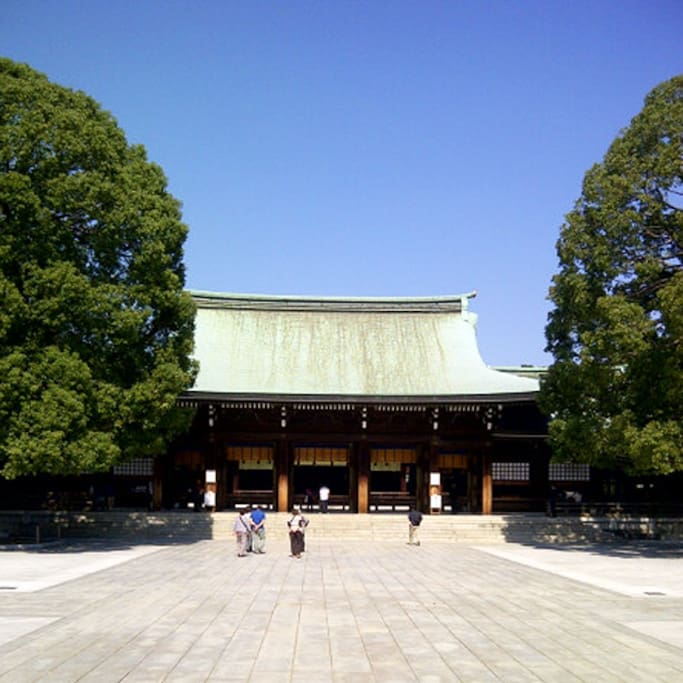Arts & Culture
Mizuma Art Gallery
3-chōme-13 IchigayatamachiContemporary
Rruga e Tekstileve, Nippori Textile Town
4-chōme-33-3 Higashinippori繊維街
新宿末廣亭
Suehirotei
Shopping
Sekaido Shinjuku Honten
3-chōme-1-1 ShinjukuBig art supply store
Tokyu Hands focuses on hobby, home improvement and lifestyle products.
90 vendasit rekomandojnë
東急ハンズ新宿店
5-chōme-24-2 SendagayaTokyu Hands focuses on hobby, home improvement and lifestyle products.
Drinks & Nightlife
The history of Shinjuku West gate area shopping street goes back to the immediate postwar years.
Around 1946, the district was a devastated land covered by wreckage.
20 vendasit rekomandojnë
LABI
The history of Shinjuku West gate area shopping street goes back to the immediate postwar years.
Around 1946, the district was a devastated land covered by wreckage.
Shinjuku Golden Gai is a small area of Shinjuku, Tokyo, Japan,famous both as an area of architectural interest and for its nightlife.
62 vendasit rekomandojnë
流民
1-chōme-1-5 KabukichōShinjuku Golden Gai is a small area of Shinjuku, Tokyo, Japan,famous both as an area of architectural interest and for its nightlife.
Hotaru
4-4 Yochōmachihotaru
角打ち 鈴傳
1-chōme-10 YotsuyaStanding bar Suzuden
Shuko Takigiya
7-11 ArakichōTakigiya
Everything Else
Shinjuku Gyoen National Garden (新宿御苑 Shinjuku Gyoen?) is a large park with an eminent garden in Shinjuku and Shibuya, Tokyo, Japan. It was originally a residence of the Naitō family in the Edo period.
2181 vendasit rekomandojnë
Kopshti Kombëtar Shinjuku Gyoen
11 NaitōmachiShinjuku Gyoen National Garden (新宿御苑 Shinjuku Gyoen?) is a large park with an eminent garden in Shinjuku and Shibuya, Tokyo, Japan. It was originally a residence of the Naitō family in the Edo period.
Bentenyu
5-1 Yochōmachibathhouse
Fishing Culture Museum
18-7 AizumichōFishing culture museum
Shinjuku Historical Museum
12-16 YotsuyasaneichōTown historical museum
銀鈴会館
2-chōme-19 KagurazakaTheatre
Yasukuni shrine
It was founded by Emperor Meiji and commemorates anyone who had died in service of the Empire of Japan.
127 vendasit rekomandojnë
Tempulli Yasukuni
3-chōme-1-1 KudankitaYasukuni shrine
It was founded by Emperor Meiji and commemorates anyone who had died in service of the Empire of Japan.
Hanazono shrine
This shrine was founded in the mid-17th century.
400 vendasit rekomandojnë
Hanazono Shrine
5-chōme-17-3 ShinjukuHanazono shrine
This shrine was founded in the mid-17th century.
Food Scene
旬菜料理ほしの
15-50 FunamachiJapanese Restaurant. The owner can speak english very well.
tokiya
Doraemon Drayaki
Dorayaki is a type of Japanese confection, а red bean pancake which consists of two small pancake-like patties made from castella wrapped around a filling of sweet
Tokiya
1-chōme-5-1 Nishishinjukutokiya
Doraemon Drayaki
Dorayaki is a type of Japanese confection, а red bean pancake which consists of two small pancake-like patties made from castella wrapped around a filling of sweet
wakaba
Taiyaki (鯛焼き) is a Japanese fish-shaped cake. The most common filling is red bean paste that is made from sweetened azuki beans.
たいやき わかば
1-10 若葉wakaba
Taiyaki (鯛焼き) is a Japanese fish-shaped cake. The most common filling is red bean paste that is made from sweetened azuki beans.
Sumo Chankonabe
Chankonabe (ちゃんこ鍋) is a Japanese stew (a type of nabemono or one-pot dish) commonly eaten in vast quantity by sumo wrestlers as part of a weight-gain diet.
くらち 新宿別館
7-3 YochōmachiSumo Chankonabe
Chankonabe (ちゃんこ鍋) is a Japanese stew (a type of nabemono or one-pot dish) commonly eaten in vast quantity by sumo wrestlers as part of a weight-gain diet.
けんけん 創作料理 酒
kenken culinary creation
ラーメン赤道
8 ArakichoRamen Restaurant
Tonkatsu Suzushin
10 ArakichōSuzushin Tonkatsu
Sushi-dokoro Shigeru
15 FunamachiSushi Restaurant
Yanaka Coffee-ten Yanaka Shop
3-chōme-8-6 Yanakayanaka
さぬきのうどんや
6-12 Sumiyoshichōudon sanuki
Yoshimi Korean Restaurant
2 SumiyoshichōKorean Restaurant
Shinjuku Unatetsu
1-chōme-11-2 KabukichōUnagi
中乃見家
8-23 Sumiyoshichōsushi restaurant
Sightseeing
Ichigaya Fish Center
1-1 市谷田町fishing hole
Hārītī (Avestan Harauhuti), is an Iranic ogress and Bactrian (Peshawari) mythological figure who was later transformed into a symbol for the protection of children.
11 vendasit rekomandojnë
Kishibojimmae Station
2-chōme-7 ZōshigayaHārītī (Avestan Harauhuti), is an Iranic ogress and Bactrian (Peshawari) mythological figure who was later transformed into a symbol for the protection of children.
Meiji Jingu Homotsuden
1-1 YoyogikamizonochōShrine
Robot Restaurant
1-chōme-7-7 KabukichōRobot Robot Restaurant
Kabukicho
Hachikō Memorial Statue
2 Chome-1 Dogenzaka22min from the apartment
Essentials
LIFE Wakamatsukawada
28-5 WakamatsuchōSUPERMARKET
丸正食品(株) 店舗東新宿店
6-15 YochōmachiSUPERMARKET
Santoku Kawada Store
3-31 KawadachōSUPERMARKET
リフレッシュ住吉
SUPERMARKET
MARUSHO Headquarters
3-chōme-3-12 YotsuyaSUPERMARKET

